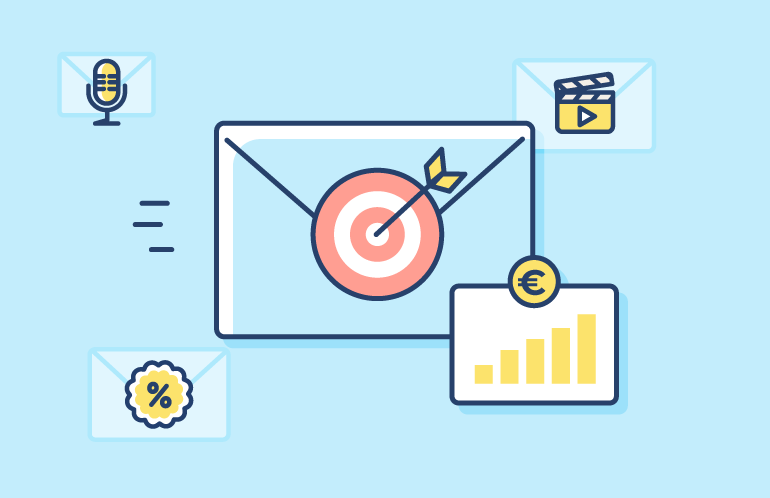Why is an email marketing strategy still so essential for marketers today?


Category: Email marketing
Social networks, online advertising and new technologies seem to dominate today's marketing landscape. However, this first impression hides a reality that marketers are well aware of: email marketing strategies continue to play a vital role in campaigns. In fact,email remains one of the most effective communication channels, with an average return on investment of 3,500%. In other words, every euro invested potentially generates €35 in benefits for companies (source: Oberlo).
Unlike online advertising or social networking posts, emails are sent directly to the recipient's inbox, where they are more likely to be noticed. Marketers can take advantage of this proximity to build personal relationships with their audience, strengthen their brand and promote their products or services in a targeted way.
According to a DMA (Data & Marketing Association) study conducted 2021, personalized email campaigns can increase conversion rates up to 6 times over non-personalized emails. Marketers can use behavioral and demographic data to segment their subscriber list into distinct groups. According to DMA, segmented emails can generate up to 58% of a company's total revenue (source: Proofjump). Personalizing advertising campaigns on social networks is more complex, since even if it is now possible to " target " a population based on various interest criteria, marketers generally don't have access to more precise data (purchasing behavior, budget...).
Email marketing is often considered one of the most cost-effective channels in digital marketing. With relatively low delivery costs compared to other marketing methods, email offers an excellent return on investment. What's more, by using analytics and A/B testing, marketers can optimize their campaigns to further improve their effectiveness and conversion rates.
Technological advances have enabled marketers to automate many aspects of their email marketing strategies. Automated email sequences can be set up to welcome new subscribers, track abandoned carts, celebrate customer birthdays, and much more. This automationsaves time,improves campaign efficiency and builds customer loyalty. A well-designed email marketing strategy also promotes customer engagement: by regularly providing useful information, exclusive promotions and relevant content, marketers can keep customers interested and coming back for future purchases.
With the adoption of the General Data Protection Regulation (GDPR) in Europe and other data privacy laws around the world, marketers need to be careful about the collection and use of personal data. Email marketing allows greater control over the data collected, and companies can easily obtain users' consent to send communications, which is not always easy on other channels (social networks in particular).
CRM platforms provide detailed reports on campaign performance. Marketers can track open, click, unsubscribe and conversion rates to assess the effectiveness of their emails. These analyses help identify what's working well and what can be improved, providing a valuable means of optimizing future campaigns.
As you can see, email is popular, and rightly so. Sometimes a victim of its own success, users' inboxes are flooded with promotional content, which can lead to saturation and a drop in the effectiveness of marketing campaigns.
Faced with this situation, marketers have begun to explore alternatives for standing out in today's competitive environment. The most popular options, social network marketing and influencer marketing, make personalization difficult. An interesting alternative is content marketing. Rather than succinct emails, this involves creating high-quality content such as blog posts, videos or podcasts, to naturally attract consumers' attention and engage them in a lasting way.
In an ever-changing marketing landscape, email marketing strategy remains an essential pillar for today's marketers. With direct communication, advanced personalization, effective automation and in-depth analytics, it offers a powerful approach to reaching and engaging target audiences. By integrating email marketing into an overall strategy, companies can strengthen their customer relationships while stimulating growth, making it an essential tool for marketers. As with any tool, however, over-solicitation can limit its effectiveness. By diversifying approaches, notably through content marketing, companies can extend their reach and create more authentic relationships with their target audience.
Contents